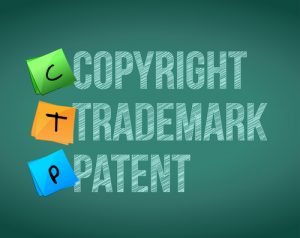Copyright and Trademark: Titles, Words & Short Phrases
{4:12 minutes to read} It is a truism among intellectual property lawyers that no matter how often one may encounter discussion of a “copyrighted word” or a “copyrighted phrase”—and this notion appears frequently in media—copyright law generally does not protect titles, words, slogans or phrases.[1]
In the United States, the Code of Federal Regulations specifically lists “[w]ords and short phrases such as names, titles and slogans” as examples of works not subject to copyright, and directs the Copyright Office not to register them.[2] However, U.S. courts have occasionally suggested that copyright claims in short phrases might be viable in exceptional cases, provided that the phrase “exhibits sufficient creativity.”[3]
Similar restrictions are in effect elsewhere: the U.K. Copyrights Designs and Patents Act 1988, for example, does not protect single words or titles, [4] nor does the German Copyright Act.[5] French law is more obscure. Professors Lucas and Kamina note that “there is a rich case law, but one difficult to distill” and different courts have been known to give conflicting judgments.[6]
Of course, words, short phrases and slogans can be protected, but not (generally) by copyright law. Instead, these are protected under the rubric of unfair competition law, of which trademark law is a subspecies.[7] However, because the purposes of copyright and trademark law are different, the scope of protection is likewise different.
As I noted in a previous post (What is Intellectual Property?), the U.S. Constitution explicitly charges American copyright law with encouraging authors to produce new works by giving them a limited-term monopoly on the exploitation of those works. Unfair competition law, as the name suggests, is intended to protect businesses and their customers from unfair trade practices, including “passing off” a competitor’s goods as those of the mark holder:
Because the mark is appurtenant to a business, the mark is protected for as long as the business continues to use it and consumers continue to recognize it; potentially forever.
Titles, short phrases, and slogans, therefore, can be protected as trademarks, provided they are used to identify goods or services in commerce.[8]
Duration, however, is a two-edged sword. Trademarks—unlike patents—cannot be warehoused. That is, a patent for a new invention or process, once registered, provides rights to the patent holder whether or not he or she chooses to practice that patent. The patent holder can, if he or she chooses, simply deny others the use of a patented invention or process, or charge license fees for that use, rather than produce goods or services utilizing that patent. Such use is called “warehousing,” since the patent is not actively used, just held. Copyrights similarly give rights to the copyright holder, whether or not the copyright holder chooses to exploit them.
Trademarks, however, require continual use to be valid. If the mark holder ceases to use the mark, it will ultimately be deemed abandoned. Consequently, one can only hold trademark rights in a short phrase, word, or title if the mark holder is consistently and continually using that mark in commerce; he or she cannot simply warehouse those words, titles, or short phrases.
In a future post, I will discuss how certain words and short phrases—in particular, titles and artist’s names—can be protected as trademarks.
Joshua Graubart
646-781-9321
jggraubart@graubartlaw.com
www.graubartlaw.com
______________________________
[1] For a quite interesting theoretical discussion of the logic underlying this exclusion, see Russ VerSteeg, Rethinking Originality (pdf), 34 WILLIAM & MARY L. REV. 801, 880-82 (1993) .
[2] 37 C.F.R. § 202.1(a). The Code of Federal Regulations governs registration of copyright by the Copyright Office, but does not govern judicial interpretation of the Copyright Act.
[3] 1 NIMMER ON COPYRIGHT §2.01[B][3] (2016). Prof. Nimmer notes that “the weight of existing authority apparently precludes copyright protection for a title regardless of its degree of creativity.” 1 NIMMER ON COPYRIGHT §2.01[B][3] n.87 (2016).
[4] Exxon Corp. v. Exxon Insurance Consultants Int’l Ltd., 1982 Ch 119, 1982 RPC 69.
[5] Adolf Dietz, “Germany” in 2 Nimmer & Geller, INTERNATIONAL COPYRIGHT LAW & PRACTICE § 2[4][a] (2007).
[6] André Lucas & Pascal Kamina, “France” in 1 Nimmer & Geller, INTERNATIONAL COPYRIGHT LAW & PRACTICE § 2[4][a] (2016).
[7] Where titles and such are protected under the copyright rubric, as in Italy, they are usually protected on more or less the same terms and principles as elsewhere are regarded as trademark or unfair competition law. Alberto Musso & Mario Fabiani, “Italy” in 2 Nimmer & Geller, INTERNATIONAL COPYRIGHT LAW & PRACTICE § 2[4][a] (2007).
[8] Unlike a copyright, a trademark cannot be transferred to another party separately from the business with which it’s associated. A markholder can sell its business, and with the business, its trademarks. Alternatively, a markholder can license out production of goods and services, but it must retain the ability to monitor the activities of its licensees. If it fails to do so, it may be deemed to have abandoned the mark.


